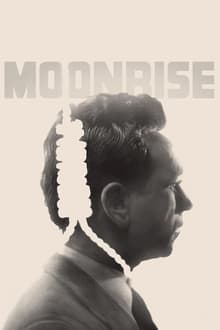
What I did was resign from the human race.
Directed by Frank Borzage and adapted from the novel by Theodore Strauss, Moonrise sees Dane Clark playing Danny Hawkins, the son of a man who was hanged for his crimes. Tormented by his father's past and bullied about it as a child, Hawkins grows into a confused and resentful man. Striking out at anyone foolish enough to cross his fractured state of mind, tragedy is quick to strike, sending Hawkins deep into the Southern mire. Can solace come in the form of Gilly Johnson? (Gail Russell) or is it simply too late to rejoin the human race?
We open with a hazy reflection that merges into the feet of walking men, men walking to the gallows as Danny Hawkins' father is hanged. The mood is well and truly set for Borzage's dreamy film noir. It's something of an oddity in many ways for it most assuredly is film noir, certainly in texture and on the technical issues it is, yet an overtly poetic heart and a distinctly less than broody ending almost steer it to being fanciful fluff. Borzage and his cinematographer, John L. Russell (in one of his first prominent assignments), do wonders with the atmosphere of the piece. Set in the steamy South, shadows and darkness are a constant and rewarding part of proceedings, while swinging lights and conversations filmed at midriffs further enhance the skew whiff state of Dane Clark's protagonist. Also of note is that some scenes showcase why Borzage was rightly held in high regard back in the day, a Ferris Wheel, a car crash and a Racoon tree top sequence (that upset and engrossed me simultaneously) are just some of the reasons why this is a must see for Borzage enthusiasts.
Coming as it does out of the Republic Pictures house of "B" moviedom, it's natural to expect some low budgetary issues. However, this is a splendid production belying its "B" movie worth. The cast are fine, with Clark particularly doing well as his character battles with anger and warmth issues, and the sets and location work are effective and benefit the story greatly. Thankfully, and even though it has no restoration, the picture quality is very good, the sound mix is a bit down at times, but by and large this one has transfered well to prints being shown on British TV. With a support cast containing Ethel Barrymore, Allyn Joslyn (excellent), Henry Morgan, Harry Carey Jr and a brief Lloyd Bridges, this is a recommended film of course. But I can't, and will not, vouch for the ending appeasing all comers. 7/10